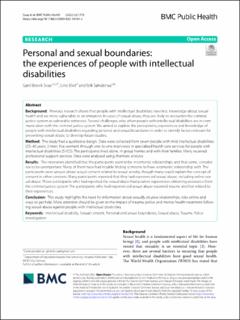| dc.contributor.author | Brevik-Svae, Gøril | |
| dc.contributor.author | Blixt, Line | |
| dc.contributor.author | Søndenaa, Erik | |
| dc.date.accessioned | 2023-01-12T10:36:42Z | |
| dc.date.available | 2023-01-12T10:36:42Z | |
| dc.date.created | 2022-10-12T09:43:36Z | |
| dc.date.issued | 2022 | |
| dc.identifier.citation | BMC Public Health. 2022, 22 (1), . | en_US |
| dc.identifier.issn | 1471-2458 | |
| dc.identifier.uri | https://hdl.handle.net/11250/3042971 | |
| dc.description.abstract | Background Previous research shows that people with intellectual disabilities have less knowledge about sexual health and are more vulnerable to victimisation. In cases of sexual abuse, they are likely to encounter the criminal justice system as vulnerable witnesses. Several challenges arise when people with intellectual disabilities are in communication with the criminal justice system. We aimed to explore the perceptions, experiences and knowledge of people with intellectual disabilities regarding personal and sexual boundaries in order to identify factors relevant for preventing sexual abuse, to develop future studies. Method The study had a qualitative design. Data were collected from seven people with mild intellectual disabilities (25–40 years; 2 men, five women) through one-to-one interviews in specialised health care services for people with intellectual disabilities (SHCS). The participants lived alone, in group homes and with their families. Many received professional support services. Data were analysed using thematic analysis. Results The interviews identified that the participants want to be in romantic relationships and that some, consider sex to be unimportant. Many of them have had trouble finding someone to have a romantic relationship with. The participants were unsure about sexual consent related to sexual activity, though many could explain the concept of consent in other contexts. Many participants reported that they had experienced sexual abuse, including online sexual abuse. Those participants who had reported the sexual abuse had positive experiences obtaining assistance from the criminal justice system. The participants who had experienced sexual abuse reported trauma and fear related to their experiences. Conclusion This study highlights the need for information about sexually abusive relationships, risks online and ways to get help. More attention should be given to the impact of trauma, police and mental health treatment following sexual abuse against people with intellectual disabilities. | en_US |
| dc.language.iso | eng | en_US |
| dc.publisher | BioMed Central | en_US |
| dc.rights | Navngivelse 4.0 Internasjonal | * |
| dc.rights.uri | http://creativecommons.org/licenses/by/4.0/deed.no | * |
| dc.title | Personal and sexual boundaries: the experiences of people with intellectual disabilities | en_US |
| dc.title.alternative | Personal and sexual boundaries: the experiences of people with intellectual disabilities | en_US |
| dc.type | Peer reviewed | en_US |
| dc.type | Journal article | en_US |
| dc.description.version | publishedVersion | en_US |
| dc.source.pagenumber | 10 | en_US |
| dc.source.volume | 22 | en_US |
| dc.source.journal | BMC Public Health | en_US |
| dc.source.issue | 1 | en_US |
| dc.identifier.doi | 10.1186/s12889-022-14181-x | |
| dc.identifier.cristin | 2060725 | |
| cristin.ispublished | true | |
| cristin.fulltext | original | |
| cristin.qualitycode | 1 | |

